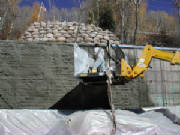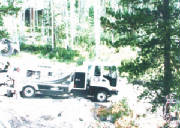Line
& Boom Pumping
For the purposes of line pump pours, our company has in its fleet a Schwing truck mounted BPA 500 line pump.
Line pumping is a necessary component in the construction industry. Many projects only have the accessibility for a
line pump. Our company’s line pumping system consists of a steel pipe side up with minimal concrete hose at the end.
The steel allows the concrete to flow more freely than through a hose setup, and helps aid in preventing blockages, which
can occur more frequently in hose set ups. We also have the smallest concrete boom pump on the Western Slope with an
outrigger width of 12 feet, which makes it ideal for road work where only one lane will need to be closed, eliminating any
extra burden on the client. It has an unfolding height of 13 feet which makes it the best option for inside boom
pump applications, eliminating slick line and labor costs.
Shotcrete & Soil Retention
Canberra
Concrete Pumping designed a two hose shotcrete nozzle system for the ability to apply large areas of shotcrete at the same
time. This allows the project to move along considerably faster and resolve the problem of cold joints. We are specialists
in shotcrete and are certified by the ACI Shotcrete Association. Shotcrete applications include water features, pools
& spas.

Slabjacking
Slabjacking is a process that provides contractors
and homeowners the option to raise or void fill sunken slabs, in place of tearing out and replacing the concrete slab.
On many occasions it requires the process of core drilling into the slab to allow the placement of concrete directly into
the area of the void for the slab to raise or void effectively. In some cases, it may be necessary to drill more holes
during the slab jack process if the concrete is not flowing properly through the areas previously drilled. Once the
slab has been effectively raised or void filled, the cored pieces are inserted back into the holes to seal them. The
cored holes will be visible, looking like small circles. Slabjacking is very effective, but it is a process that requires
some guess work, being that it is impossible to see under the slabs. Any possible information a client can provide prior to
the procedure will be very helpful to both prevent damage and to be successful with raising the slab. This information
could be, radiant heat pipes, plumbing or draining pipes, any electrical or other hazards that might be a factor.


